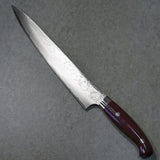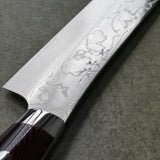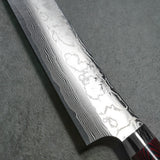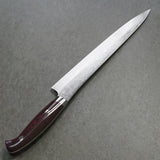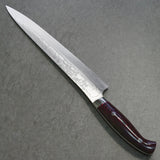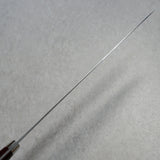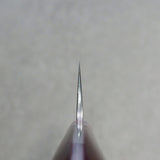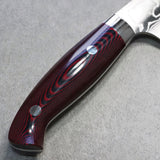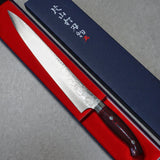Yuta Katayama Super Gold 2 Damascus Sujihiki Knife 270mm Akatsuki

Blacksmith: Katayama Yuta
Type: Sujihiki Knife (Double bevel edged)
Blade Material: Super Gold 2 SUMINAGASHI (Damascus) Clad Stainless Steel
Core: Super Gold 2 (Powder Stainless High Speed Steel)
Blade Length: approx 270 mm (10.6 ")
Total Length: approx 400 mm (15.7 ")
Thickness of Spine: approx max 2 mm
Blade Width: 41 mm
Weight: around 210 g (7.4 oz)
Handle: Micarta
HRC: 62-63
Made in Japan
※ This Damascus Blade is not black but silver.
※ As each knife is handcrafted, slight variations in size, weight, and finish should be expected.
Echizen Uchi Hamono, renowned as 'Traditional Crafts' by the Minister for Economy, Trade and Industry, are forged in Echizen City, boasting a 700-year-old tradition of Japanese knife-making. These meticulously forged knives exhibit exceptional chip resistance and exceptional edge retention. Microscopic examination reveals a remarkably homogeneous material structure.
Mr. Katayama, a master craftsman based in Echizen City, creates exquisite custom field and kitchen knives. In addition to kitchen knives, he produces outdoor knives that have been showcased at the knife show in Seki City. His designs are renowned for their ergonomic grip, striking aesthetics, and unparalleled originality.
The elegant "Sumi Nagashi" wave pattern, a hallmark of Japanese cutlery culture, is a testament to the artistry of Echizen Uchi Hamono. Similar to a Katana, the blade is meticulously crafted by layering softer and harder steels, resulting in a unique and mesmerizing pattern. The acid-etched surface, with its uneven texture, not only enhances the blade's aesthetic appeal but also contributes to a luxurious feel and facilitates effortless release of ingredients.
Add Sheath (Saya) for this knife
NIMAI-HIROGE(Spreading Two Sheets)
NIMAI-HIROGE, a unique forging technique exclusive to Echizen City, exemplifies exceptional craftsmanship. This method involves simultaneously forging two blades together, maintaining a consistent high temperature. By preventing rapid cooling, blacksmiths can strike the blades repeatedly, ensuring optimal heat distribution and minimizing carbon loss. This technique, while seemingly simple, demands years of dedicated practice. Even skilled blacksmiths may require five years to master this intricate art.
About "Super Gold 2"
Super Gold 2 is a registered trademark of Takefu Special Steel Co., Ltd., produced through powder metallurgy, resulting in a high concentration of alloying elements. This exceptional steel boasts superior corrosion resistance, exceptional hardness, exceptional toughness, and exceptional wear resistance. Despite its high Rockwell Hardness (HRC), it remains relatively easy to resharpen, while exhibiting outstanding edge retention. These remarkable qualities have earned Super Gold 2 the preference of many renowned Japanese chefs.
NOTE:
Thoroughly wash, dry, and wipe the knife after each use to prevent rust. If rust appears on the blade's edge, remove it with a sharpening stone. For rust on the blade itself, use a mild cleanser (for stainless steel) or a fine-grit scourer (for iron steel), being mindful of potential scratches.
To prevent damage, avoid twisting the blade or striking it against hard surfaces. Cutting frozen foods or bones can chip or break the thin, sharp edge of Japanese knives. As these knives are meticulously handcrafted, slight variations and minor scratches may naturally occur.














